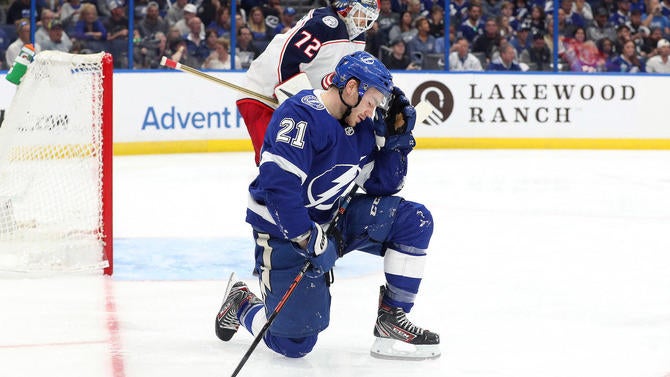After an opening two games in Tampa Bay, the Lightning are heading to Columbus down 2-0 in their opening round series against the Blue Jackets. It seems safe to say that nobody really expected this.
The Lightning finished the regular season with a record-tying 62 wins, securing 128 points in the standings and the Presidents' Trophy along the way. They were heavily, heavily favored against the eighth-seeded Blue Jackets, who just barely secured their place in the playoff picture in the final few days of the regular season.
But Columbus showed they are not to be taken lightly when they erased an early three-goal deficit to charge back and hand Tampa Bay a stunning loss in Game 1. Then, the Lightning were crushed by the Blue Jackets in a Game 2 loss that was somehow more embarrassing than the one prior.
As such, Tampa Bay now finds itself scrambling to pick up the pieces in what coach Jon Cooper called "a five-alarm fire" after Friday's loss. But how have things gotten this dire for the Lightning, who came into the playoffs as strong Stanley Cup betting favorites?
Let's have a glimpse at what's gone right for David, and what's gone oh so wrong for Goliath.

Tampa Bay's stars have gone quiet: One of Tampa Bay's biggest strength is how much firepower they have up front -- specifically with their three main offensive weapons in Nikita Kucherov, Steven Stamkos and Brayden Point. Those three guys finished the regular season with a combined 318 points (!) and each of them hit the 40-goal mark.
Through two games in this series? They have a collective total of zero goals and zero assists. During the regular season, that trio went scoreless in back-to-back games just one time.
Kucherov and Point are each a minus-two while Stamkos is a minus-three. Point, who is known as being one of the league's better two-way players, has brutal 39-percent shot share at 5-on-5 in the series so far. (Interestingly enough, Stamkos leads Tampa Bay with a 66.7 percent share in shots at 5-on-5).
Not many people would have expected this group to be without a point through two games in the series, and it certainly helps explain why the Blue Jackets have had success. Shutting down Tampa Bay has to start with shutting down its top talent.
Unfortunately for the Lightning, not only is Kucherov being figuratively taken out of the series, he also may be literally taken out of the series for the time being. With frustrations mounting at the end of Game 2, Kucherov delivered a bad hit on Columbus defenseman Markus Nutivaara that might result in a suspension. Kucherov, who had a league-leading 128 points during the regular season, has a hearing with the league Saturday.
Uhhh, Nikita Kucherov 😬 pic.twitter.com/M4DaHebfJa
— Pete Blackburn (@PeteBlackburn) April 13, 2019
Physicality: A big reason why Tampa Bay and its stars have been so ineffective to this point is because of the physicality that Columbus has brought on a consistent basis. The Blue Jackets have seemingly placed on emphasis on punishing Lightning players down low and along the walls, and they've so intelligently and effectively. They've been strong on the forecheck and have emphatically clogged lanes to disrupt the Bolts' attack.
As a result, Tampa Bay has been thrown off its game in a major way. The Lightning looked straight-up rattled by Columbus' intensity during Game 2. Early in the contest, Kucherov was steamrolled as he tried to set up shop next to the Columbus net. Later in the period, Point dropped the gloves with Zach Werenski in a fight that nobody saw coming.
As a result of the physicality and pressure that the Blue Jackets have applied, the Lightning have largely lost sight of the structure and intelligence that carried them so far during the regular season. The Bolts spent so much time chasing the game and trying to play Columbus' style instead of their own.
It led to Tampa Bay getting outworked and outsmarted, and the results were ugly.
The Blue Jackets are straight-up dunking on Tampa at this point pic.twitter.com/bOzFcReY03
— Pete Blackburn (@PeteBlackburn) April 13, 2019
Sergei Bobrovsky: After a shaky start to the series that saw him give up three goals in the first period of Game 1, Bobrovsky has returned to form as a Vezina-caliber goaltender between the pipes for Columbus. Since those three goals, he has stopped 40 of 41 shots and has left a typically potent Bolts attack fruitless and frustrated.
Bobrovsky was especially huge in the final 40 minutes of Game 1, when he was able to stop the bleeding after that first intermission and allow his team a chance to climb back into the game. He made a few huge stops on grade-A opportunities from Stamkos that would have likely served as daggers had they found the back of the net.
When Bobrovsky is at the top of his game, he's an elite goaltender with an ability to be a game-changer. That's what we saw in the final 40 minutes of Game 1 and it's why the Blue Jackets elected to hold onto him for this playoff run rather than sell him off as an expiring asset at the trade deadline. Through the first couple of games, he has rewarded that decision.
On the other end, Andrei Vasilevskiy, who could very well be this year's Vezina winner, has been porous. TampaBay has had breakdowns in front of him, but Vasilevskiy has also let in a number of goals that he likely could have (and should have) stopped. So far in the series he has stopped just 44 of 53 shots for a save percentage of .830. Not nearly good enough.
Wide-ranging contributions: While the Lightning are struggling to get results from their top players, the Blue Jackets are getting production from just about everyone. Columbus has nine goals in the series with nine different goal scorers. They even got a goal from center Riley Nash, who had three goals in 78 games during the regular season.
Trade deadline acquisition Matt Duchene also scored his first career playoff goal as part of a four-point effort in Game 2. He currently leads the Blue Jackets in points through the first two games.
It's been a full team effort from Columbus so far, which will likely need to continue if they hope to close out the series. The Blue Jackets aren't as impressive as Tampa Bay at the top of its lineup (at least not on paper) but if they have all of their pieces working together to bring collective results, well, we've seen that it's something can work out pretty well for them.
Special teams: We knew special teams would likely play a factor in this series, as they usually do when it comes this time of year, but things haven't gone the way most people expected. The Lightning finished the regular season with both the NHL's top power play attack and the top penalty-killing unit, but it's been Columbus that has held a major advantage on special teams through two games.
The Blue Jackets, who finished with the league's 28th-ranked power play in the regular season, have gone 3-for-6 on the man-advantage through the first couple of games. Going up against the Lightning's lethal PP, the Jackets have gone a perfect 5-for-5 on the kill, also picking up a shorthanded goal in the process.
That shorty came in Game 1 and served as the third period equalizer that helped fully erase the three-goal deficit that Columbus fell into.
man down? no matter. pic.twitter.com/oNxGXdOxHy
— x-Columbus Blue Jackets (@BlueJacketsNHL) April 11, 2019
Tampa Bay's ineffectiveness on special teams has been a rather surprising development, and it's been a killer. Special teams are so crucial in the postseason largely because of the momentum swings they can produce at key junctures, and those swings have certainly not been on the Lightning's side so far. Getting back in this series could largely hinge on their ability to shut down Columbus' power play offense while seizing control and confidence with their own opportunities on special teams.






















